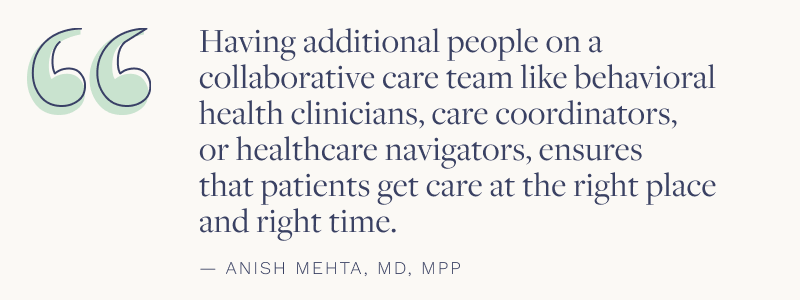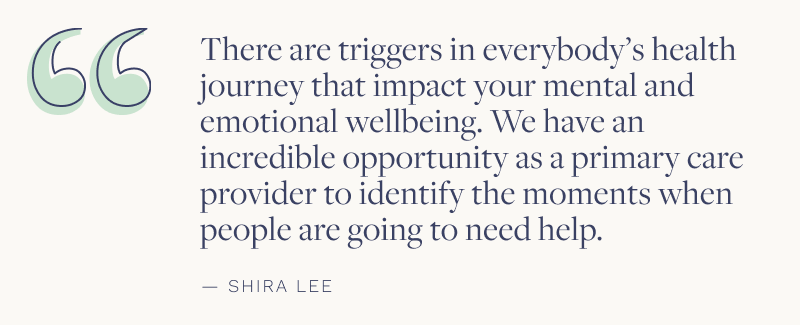What sets Eden apart from other telemedicine options? First and foremost, we’ve combined virtual and in-person services, making it simple for employees to get the care they need when and how they need it. But it’s our approach to collaborative care that our members love and rely on.
At Eden Health, patients have 24/7 access to a Care Team who works together to address their physical, mental, and financial health. By having one consistent team of MDs, mental health specialists, healthcare navigators, and physical therapists, our members can streamline their healthcare journey and ensure their care is no longer siloed.
Here, some of our providers answered questions about what practicing collaborative care means to them, how we approach it differently at Eden, and how it better supports employees and their employers.
What does collaborative care mean to you?

Brendan Sullivan: I think of it as a group of multidisciplinary providers who are collectively sharing the responsibility of providing the best quality of care for patients. Anish Mehta: Doctors are traditionally trained to practice medicine as the sole decision-maker for their patient’s care; the one person who’s in charge of their patient’s health. This idea of collaborative care came out as a reaction to that for a few reasons: 1.) Medicine is increasingly complex, and patients often have both mental and physical problems. 2.) Patients are often underserved in a model where one person is in charge of their health because they don’t get the access to care or feedback they need. With a collaborative care approach, patients have a team of people that include the doctor, but also include advanced practice clinicians, nurses, specialists, social workers, or mental health specialists working together to manage their health. It places the patient at the center, and this group of people works together to help the patient maintain their health. Shira Lee: From a mental health perspective, we know there’s a huge intertwining between your physical experience and your mental and emotional wellbeing. It’s increasingly understood that if you don’t solve one, you can’t solve the other. It’s really, really valuable to have cross-functional data sharing, communication, and collaboration in creating the care for someone and making sure everything is in sync. The patient’s experience is more seamless because they don’t have to connect the dots between disparate things — we can do that for them. |
What makes Eden’s approach to collaborative care different from other practices?
!["There's really seamless communication between Eden providers that is not the norm [at other practices.]" - Brendan Sullivan, MD](https://www.edenhealth.com/blog/wp-content/uploads/sites/1/2021/07/bn_collaborative-care-quote-brendan.png)
| BS: There’s really seamless communication between Eden providers that is not the norm, whether that’s participation huddles, our constant thread of chats to help support patients, collaborative care rounds to make sure there’s time to talk about complex patients or ad hoc conversations that help us put our heads together. AM: Our primary care providers are trained and comfortable identifying and managing mental health concerns for patients. They are supported by a team of behavioral health specialists, who can easily collaborate or comanage patients so the patient gets the best outcomes. Beyond collaboration, patients who are in our primary care have access to mental health resources even if it’s not a therapy session every week. It’s coaching, it’s information about self-help and how you can manage your mental health on your own or getting referrals. So even if you’re not getting one-on-one therapy with us, you still have that focus on mental health as a part of your primary care. SL: Our cross-disciplinary providers share key data and collaborate on creating someone’s care plan. This ensures it’s a seamless experience for the patient and ends up with a more effective result because you’re treating the different aspects of someone’s experience. If you help them with their mental and emotional wellbeing, they’ll be better able to handle the medical part. JG: I think it’s very unique to have primary care and mental health providers working so closely together and to have them within the same practice. Our primary care doctors have specialists on call, where they can consult on next steps for patients, which is so critical. We see a lot of waste in the medical system when patients are sent to the wrong place or being redirected — it not only wastes time but also impacts morale, mental health, and finances. I love that our healthcare navigation is so closely linked to the care our providers deliver. Not only are we ensuring a coordinated and collaborative approach for the patient, but we’re reducing unnecessary use of medical services, which can be costly to patients and their employers |
Why is it important for employers to provide access to a collaborative care practice like Eden Health?

| BS: Some HR teams are looking for a differential experience, and we’re able to understand the holistic view of the patient and provide that wraparound guidance for patients to be engaged in their care. Other HR teams might be focused on cost. Collaborative care at Eden also involves navigation of the healthcare system — another place where we can intervene and be a positive influence in directing patients to lower-cost settings, in-network options, and really understanding what their plan design is that impacts the clinical decisions that are made. AM: In the long run, collaborative care can lower expenses for payers but it’s just a much better experience for patients. Patients have providers who are more accessible and who know their full physical and mental health context. Every time the patient talks to someone on a collaborative care team, they don’t need to recreate the wheel every single time they seek care. SL: One of the biggest issues with medical care today is that it overlooks mental health barriers and it’s now well understood that if you have someone with a medical condition and a mental health condition, they’ll be three to four times more expensive per year from a medical standpoint. They’re not going to get better. There’s huge financial savings and a huge productivity and quality of life impact involved. The biggest challenge with mental health is access — some of that is people’s recognition that they need it and willingness to seek treatment, some of that is the ability to find that care. If you wrap mental health care together with primary care, there’s no stigma, it’s easy to access, there’s no judgment. If you have PCPs who are fluent in mental health and who can recognize needs and triggers and put out screeners in a way that doesn’t make patients uncomfortable, you get help for people who need it and you don’t overtreat people who don’t need that help. In the long run, your people are happier and more productive and employers save money. JG: Most HR professionals aren’t in a position to do the amount of follow-up that they wish they could or that an employee needs to fully resolve a claims issue or track down an appropriate provider that’s in-network. Many HR departments don’t have the resources or claims experts on staff. Our healthcare navigation team is staffed with benefits, claims, and provider referral subject matter experts who work with insurance carriers in order to move the administrative process forward for the patient— we take that off of the employer’s plate. A lot of employers have self-funded insurance, meaning it comes out of their own pocket and they have an interest in containing those costs. In order to do that, you need to get your employees to the right care at the right time — you have to be able to ensure that they’re not wasteful in the way that they’re accessing healthcare. The average person is pretty wasteful when we go through the medical system. Having all of your care coordinated through a primary care provider who really takes the time to understand you and your needs will ensure that the next step you take is valuable and gets you closer to your personalized health goal. Also, we’re prepared to talk to employees: We can really get into the nitty-gritty of how they use healthcare and what they need to think about when choosing an insurance plan during open enrollment or as a new employee. |
Why is collaborative care better than having just one doctor?
| BS: It acknowledges the limitations of what any single person can do both in terms of what their scope of knowledge and skillset is. It also acknowledges the logistical limitations around access and the reality of a workday schedule compared to patients needing assistance 24/7. AM: Having additional people on a collaborative care team like behavioral health clinicians, care coordinators, or healthcare navigators, ensures that patients get care at the right place and right time. With those team members, the patient gets help when they need it, and has proactive outreach and a better experience overall. |
How are other components of care — aside from primary care — integral to overall health?

| SL: There are triggers in everybody’s health journey that impact your mental and emotional wellbeing. Mental health is in some ways a chronic condition — you can have it under management, but may experience flare-ups or stressors. We have an incredible opportunity as a primary care provider to identify the moments when people are going to need help. Those are moments when we can know that part of their care for this medical experience should be mental health support, even if we don’t refer them to therapy right away. Let’s catch them early and help them. JG: I view healthcare through a few lenses: financial, accessibility, and emotional. In terms of finances, our Navigation team can provide financial guidance when it comes to healthcare. We really strive to provide that gut check for our patients when they ask “Should I pay this bill?” or “Did my claim process correctly?” and if it’s not right, taking that burden from them and going and getting it fixed rather than them having to do it. When it comes to accessing care, we really help patients break down barriers and help them find the right next step so they actually get the care they need. Finding a provider who meets your needs, offers the services you need, that is in-network with your insurance, and is accepting new patients can take hours. We’re thrilled to be able to handle all of that for our patients so that they can focus on taking care of themselves, their families, and other important things in their life. We’re also aware of the emotional side of receiving care. If your doctor tells you they have concerns or want to order some tests, you may have emotions to process. You’re not always thinking about the next logical step. When you get a major bill in the mail, it can be shocking. We’re aiming to help patients work through the emotions associated with getting a big bill you know you can’t afford or a test that you fear is beyond what you can afford. |
This blog is intended to be informational in nature. The information and other content provided in this blog, or in any linked materials, are not intended and should not be construed as medical advice, nor is the information a substitute for professional medical expertise or treatment.
If you have any questions or concerns, please talk to your Care Team or other healthcare provider. Never disregard professional medical advice or delay in seeking it because of something you have read on this blog or in any linked materials.





